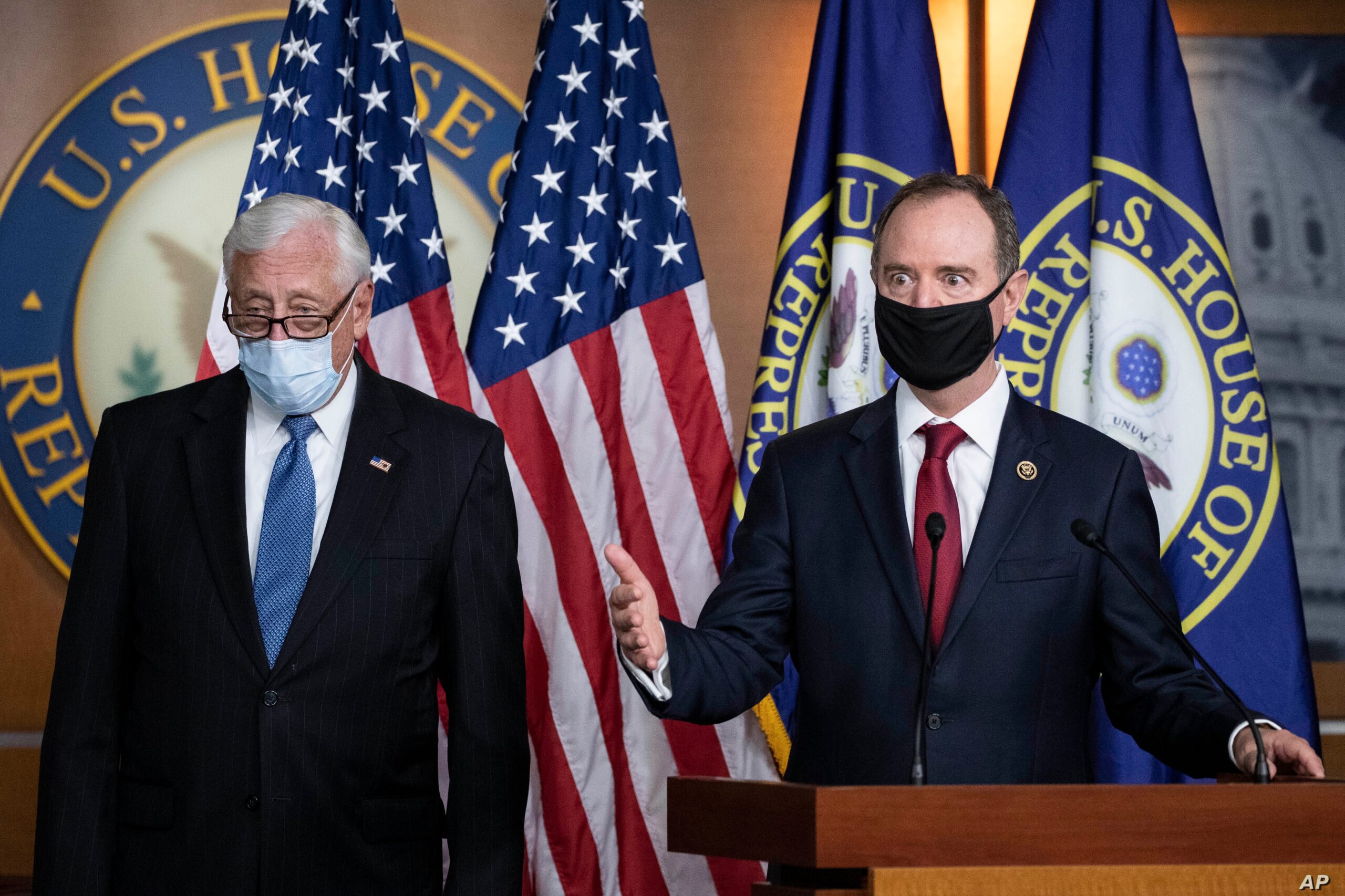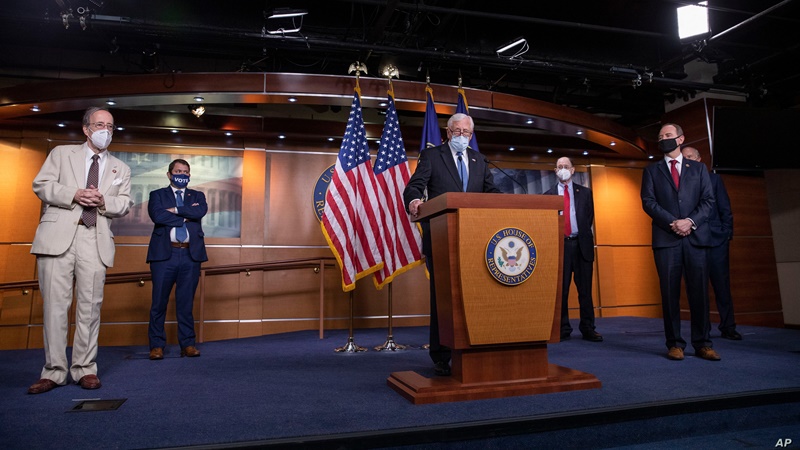WASHINGTON – Senior U.S. lawmakers walked out of a White House briefing early Tuesday, saying they are not satisfied with what the administration had to say about allegations Russia offered bounties to Taliban fighters to kill American and coalition troops in Afghanistan.
The briefing, the second in as many days, was set up to share intelligence about the alleged Russian plot with senior Democratic lawmakers, following a similar briefing late Monday with members of President Donald Trump’s party.
“The most concerning part about it is that the White House didn’t have very clear answers,” House Armed Services Committee Chairman, Rep. Adam Smith, told reporters, following Tuesday’s White House briefing.
“Very concerning to me was that their initial response was that they just wanted to make sure we knew that the president didn’t know anything,” Smith added. “That’s actually not normal.”
“Their basic position is that there was conflicting intelligence on this and, therefore, they took some actions but not as many as some of us think that they should,” he said.
Trump and various White House officials have maintained that the president was never briefed on intelligence regarding the reported plot.
But some senior officials admit the evidence was shared across the U.S. intelligence community and with allies whose troops were potentially at risk.
Media reports, by The New York Times, CNN and others, also indicate that some of the information was included in the Presidential Daily Brief, a daily summary of the top intelligence issues and concerns, in late February. Other reports suggest that Trump was given written information about the matter earlier this year.
“Based on what we heard today, it was information that (a) the president should have known about and (b) based on what we were told today, he did,” Smith said. “It seems to me like he did know about it.”
Other senior Democratic lawmakers also expressed concerns about the administration’s handling of the intelligence and, specifically, its inclination to downplay the possible consequences.
“Nothing in the briefing that we have just received led me to believe it is a hoax,” House Democratic leader Steny Hoyer told reporters.
Hoyer also said he agreed with former Trump national security adviser John Bolton, who said it was “inconceivable” that the president had not been briefed on a matter of such importance.
Fellow Democrat and House Intelligence Committee chairman Adam Schiff told reporters, “We should be considering what sanctions are appropriate to further deter Russia’s malign activities.”

Despite the concerns, many U.S. officials and Republican lawmakers have sounded a different tone over the allegations Russia was paying Taliban or Taliban-linked militants to kill U.S. and allied forces in Afghanistan.
In a statement late Monday, Chief Pentagon spokesman Jonathan Hoffman said the Defense Department, “continues to evaluate intelligence” but that so far it has “no corroborating evidence to validate recent allegations found in open-source reports.”
Key lawmakers, including Michael McCaul, the ranking Republican on the House Foreign Affairs Committee, urged caution, saying ore information is needed for what has been described as an “ongoing review.”
“We believe it is important to let this review take place before any retaliatory actions are taken,” McCaul said in a statement with fellow Republican Rep. Adam Kinzinger. “If the intelligence review process verifies the reports, we strongly encourage the Administration to take swift and serious action to hold the Putin regime accountable.”
Trump critics have often accused the U.S. president of being unduly enamored of Russian President Vladimir Putin. Schiff said, “If there’s a problem with briefing the president on intelligence he doesn’t want to hear then that’s a problem for the entire nation.”
House Foreign Affairs Committee chairman Eliot Engel said, “I don’t understand what it is about the president’s infatuation with Putin. Instead of the president telling Putin how upset we are, we get nothing.”
Major news outlets reported that Trump was briefed on the alleged plot earlier this year, with the New York Times reporting that the information was contained in the president’s Daily Brief in late February, with one official specifically citing the Feb. 27 report. Officials say that Trump often does not read his daily briefing, and instead prefers oral briefings several times a week.
U.S. officials have focused some of their attention on an April 2019 car bombing that killed three Marines.
White House Press Secretary Kayleigh McEnany repeatedly told reporters Monday that there was “no consensus” among U.S. intelligence agencies about the validity of the information and that it must be verified before it is presented to the president.
“Intelligence is verified before it reaches the president of the United States,” McEnany said. “And in this case, it was not verified.”
Director of National Intelligence John Ratcliffe said in a statement last weekend that “neither the president nor the vice president were ever briefed” on the intelligence.
Top administration officials, including Ratcliffe, National Security Adviser Robert O’Brien and White House chief of staff Mark Meadows, conducted a classified briefing Monday for eight House Republicans about the matter ahead of the Tuesday briefing for Democratic lawmakers.
Ratcliffe and CIA Director Gina Haspel both released statements late Monday, defending the handling of the intelligence and criticizing the leaks to the media.
“The selective leaking of any classified information disrupts the vital interagency work to collect, assess and mitigate threats and places our forces at risk. It is also, simply put, a crime,” Ratcliffe said in his statement.
“We are still investigating the alleged intelligence referenced in recent media reporting and we will brief the president and congressional leaders at the appropriate time,” he said.
Haspel said that while initial intelligence reports “often require additional collection and validation,” such information is “shared throughout the national security community – and with U.S. allies – as part of our ongoing efforts to ensure the safety of coalition forces overseas.”
“Leaks compromise and disrupt the critical interagency work to collect, assess and ascribe culpability,” Haspel said.
Writer Ken Bredemeier, Congressional correspondent Katherine Gypson and White House Bureau Chief Steve Herman contributed to this report.
VOA / Balkantimes.press
Napomena o autorskim pravima: Dozvoljeno preuzimanje sadržaja isključivo uz navođenje linka prema stranici našeg portala sa koje je sadržaj preuzet. Stavovi izraženi u ovom tekstu autorovi su i ne odražavaju nužno uredničku politiku The Balkantimes Press.
Copyright Notice: It is allowed to download the content only by providing a link to the page of our portal from which the content was downloaded. The views expressed in this text are those of the authors and do not necessarily reflect the editorial policies of The Balkantimes Press.

